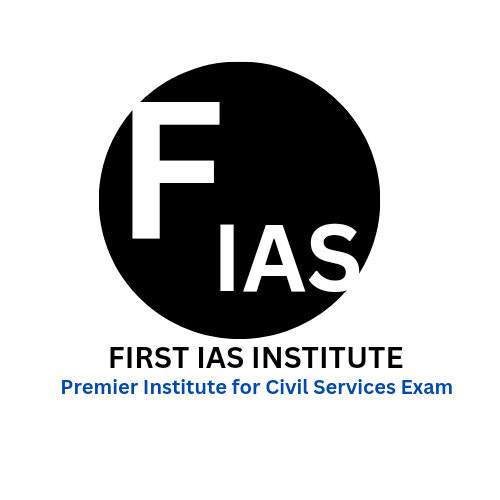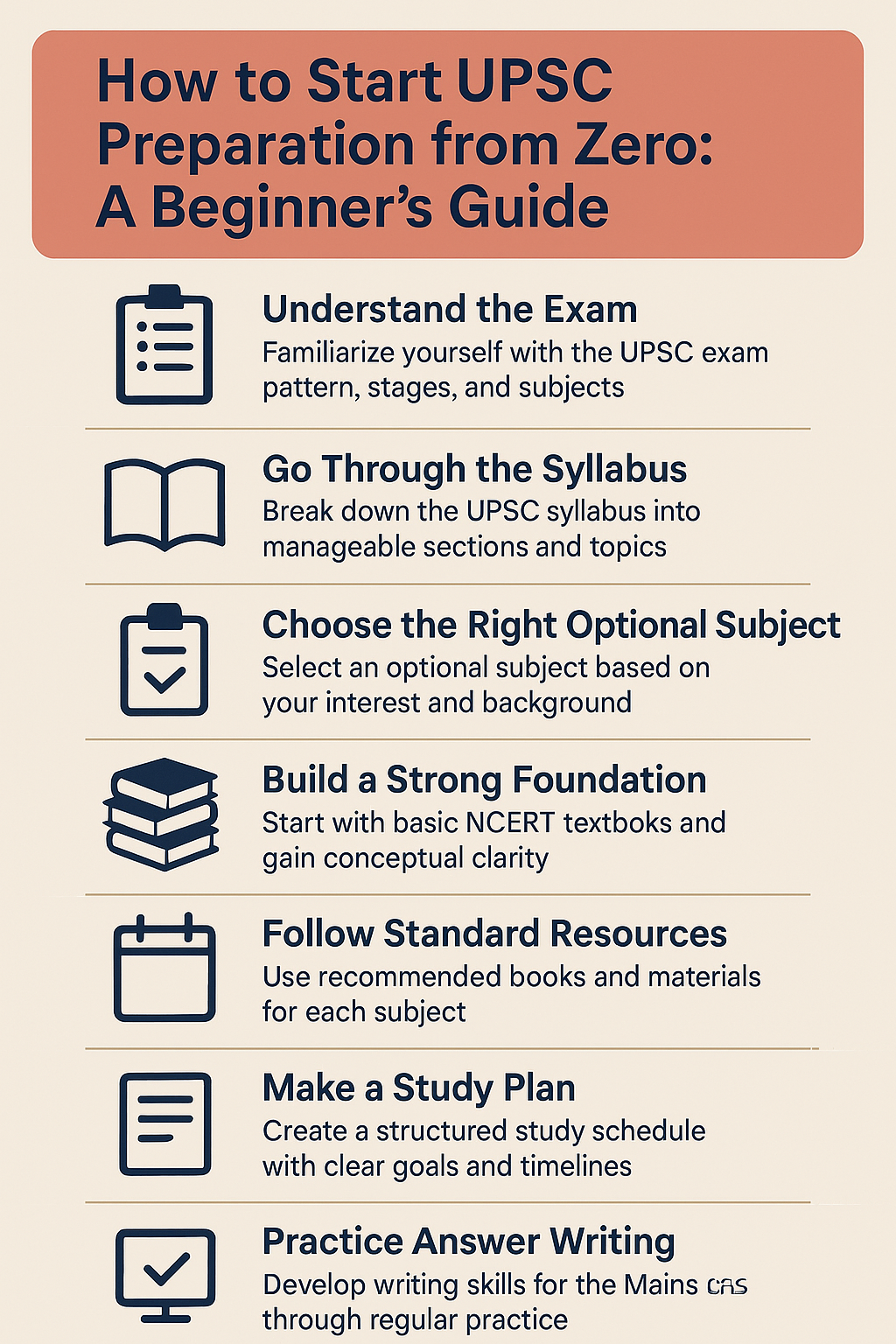How to Start UPSC Preparation from Zero: A Beginner's Guide
Preparing for the UPSC Civil Services Examination (CSE) is a journey that transforms not just your career path, but your entire outlook on life. It is one of the most prestigious and competitive exams in India, opening doors to careers in the Indian Administrative Service (IAS), Indian Police Service (IPS), Indian Foreign Service (IFS), and many more. If you're a complete beginner and wondering how to start your UPSC preparation from scratch, this guide is for you.
In this detailed roadmap, we’ll break down the syllabus, suggest the best resources, share smart study strategies, and help you build a solid foundation. Let’s get started.
Join WhatsApp community for Free Notifications, Updates, Study Material, Mock Tests, Internship Updates, and Current Affairs - CLICK HERE TO JOIN
Step 1: Understand the UPSC Exam Structure
Before diving into preparation, you must understand the three stages of the UPSC Civil Services Examination:
1. Preliminary Exam (Prelims)
- Objective-type
- Two papers: General Studies Paper I and CSAT (Paper II – qualifying in nature)
- Conducted to screen candidates for the Mains
2. Main Examination (Mains)
- Descriptive-type
- Nine papers (two qualifying, seven counted for merit)
- Includes Essay, four General Studies papers, and two Optional Subject papers
3. Personality Test (Interview)
- Tests mental alertness, critical thinking, communication skills, and overall personality
Step 2: Go Through the UPSC Syllabus
The syllabus is your holy grail. You need to read it multiple times to internalize what’s expected. Here's a simplified breakdown:
Prelims Syllabus
- GS Paper I: History, Geography, Polity, Economy, Environment, Science, and Current Affairs
- CSAT Paper II: Comprehension, Logical Reasoning, Basic Numeracy
Mains Syllabus
- GS Paper I: Indian Heritage and Culture, History, Geography
- GS Paper II: Polity, Governance, Constitution, Social Justice
- GS Paper III: Economy, Science & Technology, Environment, Internal Security
- GS Paper IV: Ethics, Integrity, and Aptitude
- Essay: Two essays of 1000-1200 words each
- Optional Subject: Two papers of a chosen subject (like Sociology, Geography, PSIR, etc.)
To Enroll in FIRST IAS INSTITUTE - Click Here
Step 3: Choose the Right Optional Subject
Selecting the optional subject is crucial. Consider:
- Your graduation background
- Availability of resources and guidance
- Interest in the subject
- Scoring trends (but don’t rely solely on them)
Some popular optional subjects: Sociology, Geography, PSIR (Political Science & International Relations), Anthropology, History, and Public Administration.
Step 4: Build a Strong Foundation
Recommended NCERT Books (Class 6-12)
- History: Class 6-12 NCERTs, especially “Themes in Indian History”
- Geography: Class 6-12 Geography NCERTs
- Polity: Class 9-12 Political Science NCERTs
- Economics: Class 9-12 Economics NCERTs
- Science: Class 6-10 General Science (for non-science background students)
- Sociology/Environment: Class 11-12 NCERTs
These books offer clarity and concise information, perfect for beginners.
Join WhatsApp community for Free Notifications, Updates, Study Material, Mock Tests, Internship Updates, and Current Affairs - CLICK HERE TO JOIN
Step 5: Follow Standard Reference Books
Once you've completed the NCERTs, move on to standard books:
Subject Book Polity Indian Polity by M. Laxmikanth History India’s Struggle for Independence by Bipan Chandra Geography Certificate Physical and Human Geography by G.C. Leong Economy Indian Economy by Ramesh Singh Environment Shankar IAS Environment Book CSAT CSAT Manual by TMH or Crack CSAT by Arihant Publications
Step 6: Make a Study Plan
Creating a structured study plan is essential. Here’s a sample 12-month plan for beginners:
Months 1-3: Foundation Building
- Read NCERTs (target 2-3 subjects simultaneously)
- Start with Polity, History, and Geography
- Daily newspaper reading (The Hindu or Indian Express)
- Make notes chapter-wise
Months 4-6: Advanced Preparation
- Begin standard books
- Solve previous years’ Prelims questions
- Practice answer writing for Mains (start small)
- Keep revising NCERTs
Months 7-9: Optional Subject + Mains Focus
- Start optional subject
- Continue GS Mains preparation
- Practice writing full-length answers and essays
- Take mock tests for Prelims
Months 10-12: Revision + Mock Tests
- Revise GS and optional notes
- Take full-length Prelims test series
- Attempt Mains test series (if time permits)
- Revise current affairs of the past 1 year
To Enroll in FIRST IAS INSTITUTE - Click Here
Step 7: Daily Schedule for Beginners
Here’s an example of a beginner-friendly day plan:
Time Activity 6:00 – 7:00 AM Newspaper Reading + Note-Making 7:00 – 8:30 AM Subject 1 (e.g., Polity NCERT) 8:30 – 10:00 AM Subject 2 (e.g., Geography NCERT) 10:00 – 10:30 AM Break 10:30 – 12:00 PM CSAT Practice or Current Affairs 12:00 – 2:00 PM Lunch + Rest 2:00 – 4:00 PM Optional Subject / Essay Practice 4:00 – 6:00 PM Mains Answer Writing / Revision 6:00 – 7:00 PM Walk / Hobby / Light Reading 7:00 – 9:00 PM Revision + Quick MCQs Practice 9:00 – 10:00 PM Dinner + Wind Down Customize this schedule to fit your personal routine.
Step 8: Current Affairs – Stay Updated
Current affairs form a crucial part of all three stages. Here’s how to cover them:
- Read The Hindu or The Indian Express daily
- Follow monthly current affairs magazines (Vision IAS, Insights, etc.)
- Watch video analysis for weekly summaries (e.g., StudyIQ, Drishti IAS)
- Maintain your own notes or digital folders topic-wise
Step 9: Practice Answer Writing
Start answer writing gradually once you’re comfortable with the syllabus. Follow these steps:
- Begin with 150-200 word answers
- Join Mains answer writing initiatives (like Insights Secure, ForumIAS)
- Practice 2-3 answers per day
- Get your answers peer-reviewed or use model answers for comparison
Join WhatsApp community for Free Notifications, Updates, Study Material, Mock Tests, Internship Updates, and Current Affairs - CLICK HERE TO JOIN
Step 10: Take Mock Tests
Mock tests are vital to assess your preparation.
For Prelims:
- Enroll in a test series (Vision IAS, Insights, Vajiram, etc.)
- Attempt topic-wise and full-length tests
- Analyze your mistakes thoroughly
For Mains:
- Join a Mains test series (optional but highly recommended)
- Practice essay writing every week
Step 11: Revise Regularly
Without revision, even the best preparation will fail.
Tips:
- Make short notes and mind maps
- Use spaced repetition techniques
- Revise at least 3-4 times before the actual exam
Step 12: Stay Consistent and Motivated
The UPSC journey is long and demanding. Stay mentally strong by:
- Surrounding yourself with positive peers
- Taking short breaks to prevent burnout
- Celebrating small milestones
- Staying away from unnecessary social media distractions
Final Words: You Can Do It!
Starting UPSC preparation from zero can feel overwhelming, but remember: every topper was once a beginner. With a clear strategy, the right resources, and dedicated effort, you can steadily move toward your goal of becoming a civil servant.
Start small, be consistent, and stay focused. UPSC is not just an exam, it’s a test of your patience, perseverance, and purpose. Begin your journey today, and success will follow.
Do you have any specific queries or want a downloadable study schedule? Let me know — I’ll be happy to help!


 firstiasofficial@gmail.com
firstiasofficial@gmail.com
Leave a Comment